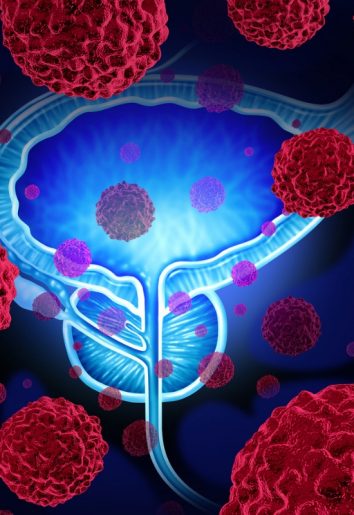The prostate, located between the penis and the bladder, is an essential part of the male reproductive system as it creates a fluid that’s used to carry sperm and keep it in a liquid state. Unfortunately, it’s not uncommon for men to develop prostate cancer, and while men of any age can develop this condition, it’s more likely to affect older men. A new study finds that exercise protects against prostate cancer, adding to the natural ways that men can reduce their risks for this type of cancer.
What is Prostate Cancer?
 Overall, prostate cancer is a widespread problem: As the American Cancer Society reports, there were 174,650 new cases in 2019. A total of 31,620 deaths were also attributed to prostate cancer last year. While advanced prostate cancer can be fatal, getting an early diagnosis will improve the effectiveness of treatment. When diagnosed early enough, standard treatments such as surgery, chemotherapy and radiation therapy are effective in eradicating this type of cancer.
Overall, prostate cancer is a widespread problem: As the American Cancer Society reports, there were 174,650 new cases in 2019. A total of 31,620 deaths were also attributed to prostate cancer last year. While advanced prostate cancer can be fatal, getting an early diagnosis will improve the effectiveness of treatment. When diagnosed early enough, standard treatments such as surgery, chemotherapy and radiation therapy are effective in eradicating this type of cancer.
Causes and Risk Factors
About half of men develop prostatic intraepithelial neoplasia (PIN) cells as they age. These are precancerous cells that increase the likelihood of developing prostate cancer. PIN cells are usually not cancerous as they start out, but may become cancerous over time. Even if they do become cancerous, they may be low-grade cancer cells, which means they will not spread and grow. However, in some cases, the PIN cells do become high-grade cancer cells, which means they will multiply and spread cancer to other cells. This condition does require treatment.
While we don’t know what causes PIN cells to develop as men age, there are certain risk factors for prostate cancer. The following risk factors can affect whether or not someone will develop prostate cancer:
- Age: Men over 50 are more likely to be affected.
- Race: Black males are most likely to develop prostate cancer, followed by white males. Asian and Hispanic males are least likely to develop the condition.
- Heredity: A family history of prostate cancer also raises the risks.
- Genetics: Defective BRCA1 and BRCA2 genes may also increase your risk of contracting this type of cancer.
Symptoms of prostate cancer include:
- difficulty initiating and maintaining a urine stream
- unusually frequent need to urinate
- bloody semen or urine
- pain during urination, or during ejaculation
- erectile dysfunction
- experiencing pain when in a sitting position, which is the result of an enlarged prostate
Research Suggests Exercise Protects Against Prostate Cancer
While some risk factors for developing prostate cancer are known, research has focused on finding additional factors that influence who is more likely to get the disease. Some of this research has found that a deficiency of certain nutrients, such as folic acid, vitamin E and calcium, does increase the risk of prostate cancer. While ensuring you get enough of these nutrients can help, a newer study suggests physical activity also plays an important role.
A joint study conducted by researchers at Imperial College London and the University of Bristol found evidence that exercise protects against prostate cancer. The researchers examined the medical records for 79,148 men who had been diagnosed with prostate cancer, alongside the records for 61,106 men who were cancer-free. They compared these records to the known risk factors for developing prostate cancer.
Examining the records, researchers found that those who had a genetic predisposition for being physically active had a 51 percent lower risk of developing prostate cancer.
Although the study looked at a total of 22 risk factors, the researchers noted that exercise and physical activity had the biggest impact on the likelihood of developing prostate cancer. Dr. Sarah Lewis, who co-authored the study, suggested that men can reduce their risks for prostate cancer by living more physically active lifestyles.
Natural Ways to Reduce Your Risks for Prostate Cancer
In addition to getting more exercise, there are more natural ways to reduce prostate cancer risks. Here are a few suggestions.
Eat Red Foods
Tomatoes, watermelon and other fruits with a red pulp contain a compound called lycopene. This is a powerful antioxidant that may reduce the risk of developing prostate cancer for men. While research is ongoing, it’s believed that redder tomatoes contain more potent concentrations of lycopene.
Add More Plant-Based Foods
 While eating more red foods may boost your resistance to prostate cancer, all plant-based foods can help. By eating a broad range of fruits and vegetables, you’ll be giving your body an ample supply of nutrients to boost your immune system and fight off all types of cancer.
While eating more red foods may boost your resistance to prostate cancer, all plant-based foods can help. By eating a broad range of fruits and vegetables, you’ll be giving your body an ample supply of nutrients to boost your immune system and fight off all types of cancer.
Take a Dietary Supplement
Adding a supplement to your daily routine can also help you maintain the nutrients your body needs to guard against prostate cancer. Prostachron is specifically formulated with vitamins and other nutrients that help support a healthy immune system and guard against the development of prostate cancer.
Lose Weight
Limiting your calorie intake and getting more physical activity will help you get your weight under control. Obesity weakens your immune system and promotes the conditions that encourage the growth of cancer cells, so getting your weight under control can have a significant impact on prostate health.
Increase Your Coffee Consumption
Some research indicates that drinking three to four cups of coffee each day can decrease your risk of developing prostate cancer. The 2014 study indicated that every three cups of coffee consumed decreased prostate cancer risk by 11 percent. The researchers also noted that boiling coffee, instead of brewing it, also had an impact on the study’s results.

